六年级上册英语复习
六年级上册英语知识点归纳

often经常 sometimes 有时候 never 从来不二、习惯语搭配:by bike/bus/plane/subway/train/ship/taxi/ferry骑自行车/乘公共汽车/飞机/地铁/火车/船/出租汽车/渡轮take the No.57 bus乘57路公 on foot步行slow down慢下来pay attention to注意 traffic lights 交通信号灯 look right向右看cross the road横穿马路 get off下车 at home在家 traffic rules交通规则 get to到达 get on 上车 be far from…表示离某地远三、惯用表达式:Wait!等一等! Hooray太好了!I see. 我明白了。
Go at a green light 绿灯行Stop at a red light 红灯停 Wait at a yellow light 黄灯等四、公式化句型:1、如何询问对方的出行方式:How do you come(to)+地点?你(们)怎么来···的?2、如何用must表示必须做某事:某人+must+动词原形(+其它). ···必须···。
3、告诫别人不要做某事的句型:Don’t +动词原形(+其它). .不要/别···。
五、例句:How do you go to school? 你怎么去上学?Usually I go to school on foot. Sometimes I go by bus.通常我步行去上学。
有时候骑自行车去。
How can I get to Zhongshan Park ? 我怎么到达中山公园?You can go by the No. 15 bus. 你可以坐15路公共汽车去。
最新完整版人教版六年级英语上册总复习各单元知识点归纳总结及作文范文汇总
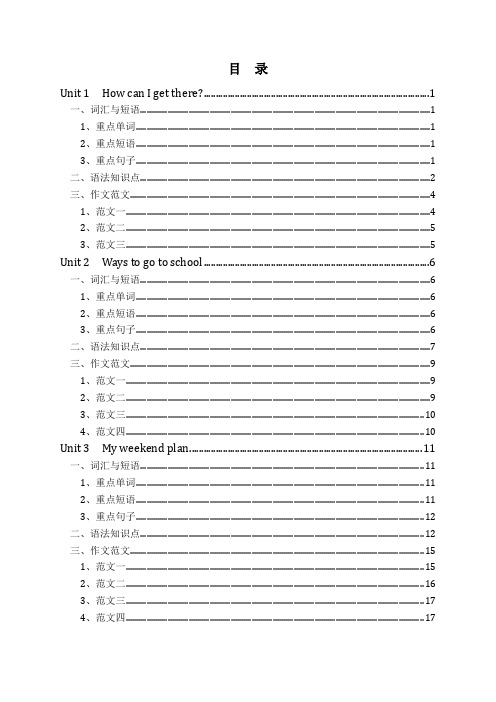
目录Unit 1 How can I get there? (1)一、词汇与短语 (1)1、重点单词 (1)2、重点短语 (1)3、重点句子 (1)二、语法知识点 (2)三、作文范文 (4)1、范文一 (4)2、范文二 (5)3、范文三 (5)Unit 2 Ways to go to school (6)一、词汇与短语 (6)1、重点单词 (6)2、重点短语 (6)3、重点句子 (6)二、语法知识点 (7)三、作文范文 (9)1、范文一 (9)2、范文二 (9)3、范文三 (10)4、范文四 (10)Unit 3 My weekend plan (11)一、词汇与短语 (11)1、重点单词 (11)2、重点短语 (11)3、重点句子 (12)二、语法知识点 (12)三、作文范文 (15)1、范文一 (15)2、范文二 (16)3、范文三 (17)4、范文四 (17)Unit 4 I have a pen pal (18)一、词汇与短语 (18)1、重点单词 (18)2、重点短语 (18)3、重点句子 (18)二、语法知识点 (19)三、作文范文 (23)1、范文一 (24)2、范文二 (24)3、范文三 (25)4、范文四 (25)Unit 5 What does he do (27)一、词汇与短语 (27)1、重点单词 (27)2、重点短语 (27)3、重点句子 (27)二、语法知识点 (28)三、作文范文 (30)1、范文一 (30)2、范文二 (31)3、范文三 (31)Unit 6 How do you feel (32)一、词汇与短语 (32)1、重点单词 (32)2、重点短语 (32)3、重点句子 (32)二、语法知识点 (33)三、作文范文 (34)1、范文一 (35)2、范文二 (35)3、范文三 (35)4、范文四 (35)语法知识点 (37)肯定句如何变否定句 (37)肯定句如何变一般疑问句 (39)划线部分提问(如何变特殊疑问句) (41)写作训练 (43)写作训练答案 (47)Unit 1 How can I get there?一、词汇与短语1、重点单词1.science /ˈsaɪəns/ 科学2.museum /mjuˈziːəm/ 博物馆3.post office /ˈpəʊst ɒfɪs/ 邮局4.bookstore /ˈbʊkstɔː/ 书店5.cinema /ˈsɪnəmə/ 电影院6.hospital /ˈhɒspɪtl/ 医院7.crossing /ˈkrɒsɪŋ/ 十字路口8.turn /tɜːn/ 转湾9.left /left/ 左10.right /raɪt/ 右11.straight /streɪt/ 笔直地12.ask /ɑːsk/ 问13.sir /sɜː(r)/ (对男子的礼貌称呼)先生14.interesting /ˈɪntrəstɪŋ/ 有趣的15.Italian /ɪˈtæliən/ 意大利的16.restaurant /ˈrestrɒnt/ 餐馆17.pizza /ˈpiːtsə/ 比萨饼18.street /striːt]/ 大街;街道19.get /get/ 到达20.gave /ɡeɪv/( give/ɡɪv/的过去式) 给21.follow /ˈfɒləʊ/ 跟着22.tell /tel/ 告诉2、重点短语1.science museum 科学博物馆2.near the library 图书馆附近3.get there 到达那里4.go straight 直走5.turn left/right 向左转/右转6.over there 在那边7.next to the museum 在博物馆旁边8.pet hospital 宠物医院9.Palace museum 故宫博物院10.in front of 在…前面11.behind the post office 在邮局后面12.beside the park 在公园旁边13.be far from 离……很远14.be far from home 远离家乡3、重点句子1. --Where is the museum shop?博物馆商店在哪里--It's near the door. 它在门附近。
六年级上册英语知识点总结单词复习
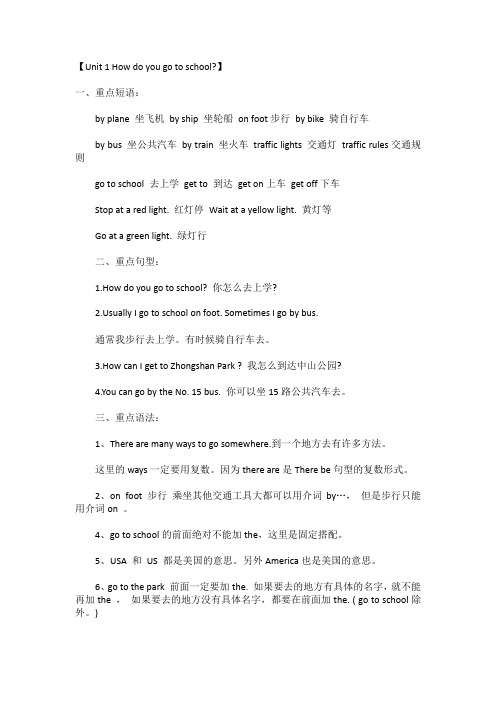
【Unit 1 How do you go to school?】一、重点短语:by plane 坐飞机by ship 坐轮船on foot步行by bike 骑自行车by bus 坐公共汽车by train 坐火车traffic lights 交通灯traffic rules交通规则go to school 去上学get to 到达get on上车get off下车Stop at a red light. 红灯停Wait at a yellow light. 黄灯等Go at a green light. 绿灯行二、重点句型:1.How do you go to school? 你怎么去上学?ually I go to school on foot. Sometimes I go by bus.通常我步行去上学。
有时候骑自行车去。
3.How can I get to Zhongshan Park ? 我怎么到达中山公园?4.You can go by the No. 15 bus. 你可以坐15路公共汽车去。
三、重点语法:1、There are many ways to go somewhere.到一个地方去有许多方法。
这里的ways一定要用复数。
因为there are是There be句型的复数形式。
2、on foot 步行乘坐其他交通工具大都可以用介词by…,但是步行只能用介词on 。
4、go to school的前面绝对不能加the,这里是固定搭配。
5、USA 和US 都是美国的意思。
另外America也是美国的意思。
6、go to the park 前面一定要加the. 如果要去的地方有具体的名字,就不能再加the ,如果要去的地方没有具体名字,都要在前面加the. ( go to school除外。
)7、How do you go to …?你怎样到达某个地方?如果要问的是第三人称单数,则要用:How does he/she…go to …?8、反义词:get on(上车)---get off(下车) near(近的)—far(远的) fast(快的)—slow(慢的)because(因为)—why(为什么) same(相同的)—different(不同的)9、近义词:see you---goodbye sure---certainly---of course10、频度副词:always 总是,一直usually 通常often经常sometimes 有时候never 从来不【Unit 2 Where is the science museum?】一、重点短语:library 图书馆post office 邮局hospital医院cinema 电*bookstore书店science museum科学博物馆turn left向左转turn right 向右转go straight 直行north北south南east东west西next to靠近、与……。
六年级上册英语重点单词重点句子总复习

PEP六年级上册四会单词及句子复习Unit1第一单元四会单词:Sciencemuseum科学博物馆postoffice邮局bookstore书店cinema电影院hospital医院crossing十字路口turnleft向左转gostraight直走turnright向右转四会句子:1--Whereisthemuseumshop博物馆的商店在哪儿--It`snearthedoor在大门附近2--Howcanwegetthere我们怎么到那儿--Turnleftatthebookstore到书店左转Unit2第二单元四会单词:onfoot走路bybus乘公共汽车bytaxi乘出租车byplane乘飞机bysubway乘地铁byship乘船bytrain乘火车slowdown减速stop停下wait等go走四会句子:1--Howdoyoucometoschool你怎么来学校的--Usually,Icomeonfoot通常我走路来2IntheUSApeopleonbikesmustwearone.在美国骑自行车的人必须戴头盔;3 Don’tgoattheredlight别闯红灯;4Imustpayattentiontothetrafficlights我必须注意交通信号灯Unit3第三单元四会单词:visitmygrandparents拜访我的外祖父母seeafilm看电影takeatrip远行gotothesupermarket去超市dictionary词典comicbook连环画书wordbook单词书postcard明信片四会句子:1--Whatareyougoingtodotomorrow你明天打算做什么--I’mgoingtohaveanartlesson.我要上美术课2 We’regoingtodrawsomepicturesinRenminPark.我要到人民公园去画画3--Whereareyougoing你们打算去哪儿--We`regoingtothecinema我们打算去电影院4Whenareyougoing你们什么时候去Unit4第四单元四会单词:dancing跳舞singing唱歌readingstories看故事书playingfootball踢足球doingkungfu打功夫cooksChinesefood做中国菜studiesChinese学习汉语doeswordpuzzles猜字谜goeshiking远足四会句子:1--WhatarePeter`shobbies彼得有什么爱好--Helikesreadingstories他喜欢读故事2--DoesheliveinSydney他住在悉尼吗--No,hedoesn`t不,他没有3--Doeshelikedoingwordpuzzlesandgoinghiking他喜欢猜字谜和远足吗--Yes,hedoes是的,他喜欢Unit5第五单元四会单词:factoryworker工厂工人postman邮递员businessman生意人policeofficer警察fisherman渔民scientist科学家pilot飞行员coach教练四会句子:1--Whatdoeshedo他是做什么的--Heisabusinessman.他是商人2--Wheredoeshework他在哪儿工作--Heworksatsea.他在海上工作;3--Howdoeshegotowork他怎么上班--Hegoestoworkbybike.他骑自行车上班;Unit6第六单元四会单词:angry生气的afraid害怕的sad悲伤地worried担心的happy开心的seeadoctor看医生domoreexercise做更多的锻炼takeadeepbreath深深吸一口气wearwarmclothes穿暖和的衣服counttoten数到十四会句子:1 They’reafraidofhim.它们害怕它2Thecatisangrywiththem.这只猫生它们的气;3What`swrong怎么了Yourfatherisill.你爸爸生病了;4Heshouldseeadoctorhismorning.他今天早上应该去看病;5Don`tbesad.别伤心PEP六年级上册常用句型问路和指路-Whereis+地点名词……在哪儿-It’s+介词短语.在……;-Howcanwe/Igetto...我们/我怎么到……呢-Turnleft/right./Gostraight./Youcangoby+交通工具.左/右转;直走;/你可以乘坐……去那儿;询问并回答对方来或去某地的交通方式:Howdoyoucome/goto+地点你/你们怎么来/去……I/Wecome/goto+地点+bybike/onfoot….我/我们骑自行车/步行……来/去……询问对方某个时间打算做某事的句型及答语:-Whatareyougoingtodo+表示将来的时间你……打算去做什么-I’mgoingto+动词原形+将来的时间.我打算……去做……询问对方打算去哪儿的句型及答语:Whereareyougoing+表示将来的时间你……打算去哪儿I’mgoingto+表示地点的名词.我打算……去….询问对方打算什么时候去做某事的句型及答语:Whenareyougoing+动词原形你打算什么时候去……Iamgoingto+动词原形+将来时间.我打算……去……;注:begoingto+动词原形=will+动词原形询问别人的爱好并作出回答:Whatis/are某人的hobby/hobbies……有什么爱好=Whatdo/does某人like主语+like/likes+动词-ing+其他.……喜欢做……=某人的hobby is/are….某人的爱好是...;助动词does引导的一般疑问句及答语:Does+第三人称单数主语+动词原形+其他……做……吗-Yes,he/she/itdoes.No,he/she/itdoesn’t.是的,他/她/它是;不,他/她/它不是;询问他人的职业并作出回答:Whatdo/does+主语+do......是做什么的=Whatbe+某人主语+be动词+a/an+职业名词.……是……询问他人的工作地点并作出回答:Wheredo/does+主语+work……在哪儿工作主语+work/works+表示地点的副词或介词短语;……在……工作;询问他人怎么去上班:Howdo/does+主语+gotowork主语+gotowork+bybike/onfoot….询问他人正在做什么及描述正在做某事:What+be+某人+doing主语+be动词+动词-ing+其他….正在…Don’t祈使句:Don’t+动词原形+其他.不要……Don’t+be+形容词+其他.不要……表达对某人或某事的关心:What’wrongwith+某人描述及提问某人的感受的句型:How+do/does某人+feel主语+feel/feels+表示感受的形容词+其他.=主语+be动词+表示感受的形容词+其他.……是……用should来给对方提建议及征求意见的句型:Whatshould某人+do某人should+动词原形.你应该…..语法复习一、现在进行时态3种变化规律1.直接加ing:do—doing draw—drawing cook—cooking answer—answering read—reading listen—listening fly—flying sing—singing play—playing2.去掉末尾的e加ing:write—writing dance—dancing take—taking have—having make—making ride—riding dive—diving3.双写末尾字母加ing:get—getting run—running swim—swimming sit—sitting put—putting你正在干什么WhatareyoudoingI’mansweringthephone.他/她/它正在干什么Whatishe/she/itdoingHe’s/She’s/It’s …他她、它们正在干什么WhataretheydoingTheyare…看到like或likes后面的动词要加上ing二、一般将来时态begoingto/will+动词原形表示一般将来时的时间状语有:thismorning,thisafternoon,thisevening,tomorrow,tonight,thisweekend,ontheweekend,nextweek,nextmonth,nextyear,nextweekend.例:今晚你将要做什么Whatareyougoingtodothisevening—I’mgoingtothecinema.I’mgoingtovisitmygrandparents.你将什么时候去Whenareyougoing—I’mgoingat7:10.你将怎样去呢Howareyougoing—I’mgoingbybus.今天下午你将要去哪里Whereareyougoingthisafternoon—I’mgoingtothebookstore.你将要买什么呢WhatareyougoingtobuyI’mgoingtobuyacomicbook.你将和谁一起去WhoareyougoingwithI’mgoingwithmyparents.三、第三人称单数后面的动词要加s或es1.一般情况加s,如:read—reads;live—lives;play—plays;sing—sings2.动词末尾以s,x,ch,sh或部分以o结尾的加es记住课本中出现的这几个:watches,teaches,goes,does,washes,passes3.辅音字母+y结尾的把y变i再加es,如:fly—flies;study—studies4.特殊情况:have--has5.第三人称单数包括:he;she;it;myfather/friend;Amy/Hangzhou等一个人名或地名;例如:Helikesdrawingpictures.Sheworksinacarcompany.Itcomesfromtheclouds.Myfathergoestoworkonfoot.LiLeioftenplayscomputergamesafterlunch.6.一般疑问句记住:前面助动词加了es,后面动词就不变化了;如:DoessheteachEnglishDoesyourpenpalliveinHangzhou四、不定冠词a和an的用法a用于辅音因素开头的单词前;an用于元音因素开头的单词前;记住课本中出现的要用an的单词:anactor;anactress;anartist;anengineer;anaccountant;anEnglishbook;anorange;anapple;anoldwoman五、动词变化为表示职业或人的单词1.动词后面加er:work—worker;teach—teacher;sing—singer;TV report—TVreporterclean—cleaner2.动词后面加or:act—actor;doctor3.末尾以e结尾的直接加r:write—writer;dance—dancer;drive—driver4.动词后面加ist:art—artist;tour—tourist5.职业男女有区别的:警察policeman—policewoman;演员actor—actress六、8个疑问词which哪一个what什么when什么时候where哪里whose谁的why为什么how怎么样who谁七、人称代词和物主代词I—my-mine我—我的-我的you—your-yours你;你们—你的;你们的-你的;你们的he—his-his他—他的-他的she—her-hers她—她的-她的we—our-ours我们—我们的-我们的they—their-theirs他们/她们/它们—他们的/她们的/它们的他们的/她们的/它们的八、can后面加动词原形WhatcanyoudoIcancookthemeals.Hecanflykites.Shecan playtheviolin.弹小提琴PEP小学英语六年级上册各单元作文一、介绍你和家人上学或上班的方式Igotoschoolonfoot.Mysistergoestoschoolonfoot,too.Mybrothergoestoschoolby bike.Myfathergoestoworkbycar.Mymothergoestoworkbybike.二、看图,说说你怎样去电影院Igotothecinema.Istartfromhere.Gostraightforfiveminutes.Thenturnleftatthe library.Gostraightforoneminute.Thelibraryisontheright.三、读读下周末你和朋友的计划I’mgoingtohaveabusyweekendwithmyfriends.OnSaturdaymorning,wearegoingtog oshpping.OnSaturdayafternoon,wearegoingtothepark.OnSundaymorning,wearego ingtogofishing.OnSundayafternoon,wearegoingtoflykites.Wewillbehappy.四、说说你和你家人的爱好;Ilikeflyingkites.Myfatherlikesdiving.Mymotherlikesplayingthepipa.Mybroth erlikesridingabike.Mysisterlikeslisteningtomusic.MyfriendJohnlikesflying kites.Amylikescollectingstamps.ZhangPenglikesplayingfootball.ChenJielike sridingabike.五、介绍你一家人的职业和上班地点和方式;Myfatherisateacher.Heworksinaschool.Hegoestoworkbycar.Mymotherisanaccoun tant.Sheworksinabank.Shegoestoworkbybus.六、写一封信给你的笔友,介绍你一家人的情况;DearAmy,MynameisSarah.I’m13.I’mtallandthin.Ilikeswimming.Myfatheris40.He’stal landstrong.Helikesreadingbooks.Heisworker.Heworksinafactory.Hegoestowork bycar.M ymotheris39.She’sshortandthin.Shelikescooking.Sheworksinabooksto re.Shegoestoworkonfoot.Yours,Sarah七、看图介绍图中这个人的情况;HeisBen.Heis26.Heisapoliceman.Hegoestowork bybus.Helikesplayingtheviolin.Helikesgoingfishing,too.。
人教版(PEP)六年级英语上册期末复习知识点

人教版(PEP)六年级英语上册期末复习知识点人教版(PEP)六年级英语上册复习知识点Unit 1 How can I get there?主要单词:science科学museum博物馆post office邮局bookstore书店cinema电影院hospital医院crossing十字路口turn转弯left 向左ask问interesting有趣的Italian意大利restaurant餐馆pizza 比萨饼street大街;街道get到达GPS全球卫星定位系统feature特点follow跟着far较远的tell告诉习惯搭配turn left向左转turn right向右转go straight直行in front of...在...前面next to挨着go straight直走near the park在公园附近on Dongfang Street在东方大街上post office邮局pet hospital 宠物医院Beihai Park北海公园Italian restaurant意大利餐馆Palace Museum故宫博物院science museum科学博物馆主要句子:☆1、☆Where is the museum shop?博物馆的市肆在哪儿?☆☆2、It’s near the door.在大门附近。
☆☆3、How can we get there?我们怎么到那儿?☆☆4、Turn left at the bookstore.在书店左转。
☆5、I want to buy a postcard.我想买一张明片。
6、I’ll ask.我去问问。
7、Wow, a talking robot!哇!一个讲话机器人。
8、What a great museum!好棒的一家博物馆!10、There is a pet hospital in my city.在我的城市有一家宠物医院。
11、Wu Yifan and Robin are looking at some robots.吴一凡和罗宾正在看一些机器人。
六年级上册英语复资料

六年级上册英语复资料以下是六年级上册英语复习资料,包括一些重点词汇、短语和句子,以及一些常见的语法知识点。
重点词汇:1. subject 科目2. math 数学3. science 科学4. social studies 社会研究5. English 英语6. Chinese 语文7. music 音乐8. art 美术9. physical education 体育10. library 图书馆常见短语:1. have a good day 过得愉快2. see you later 待会儿见3. have a good time 过得开心4. let me know 让我知道5. have a look 看一看6. have a seat 请坐7. what about you 你呢8. I don’t know 我不知道9. I think so 我认为如此10. I’m not sure 我不能确定常见句子:1. What’s your favorite subject? 你最喜欢的科目是什么?2. I like math because it’s fun. 我喜欢数学因为它很有趣。
3. Do you like science? 你喜欢科学吗?4. Yes, I do. 是的,我喜欢。
5. No, I don’t. 不,我不喜欢。
6. What’s your favorite sport? 你最喜欢的运动是什么?7. My favorite sport is basketball. 我最喜欢的运动是篮球。
8. When do you usually get up? 你通常什么时候起床?9. I usually g et up at 7 o’clock. 我通常在7点钟起床。
10. How many hours do you sleep every night? 你每晚睡多少小时?语法知识点:1. 现在进行时:表示正在进行的动作或状态,结构为“be动词+动词ing”。
六年级英语上册期末复习资料
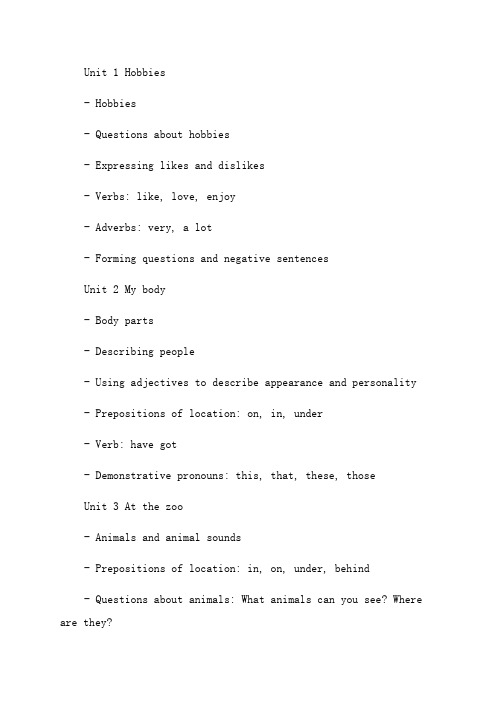
Unit 1 Hobbies- Hobbies- Questions about hobbies- Expressing likes and dislikes- Verbs: like, love, enjoy- Adverbs: very, a lot- Forming questions and negative sentencesUnit 2 My body- Body parts- Describing people- Using adjectives to describe appearance and personality - Prepositions of location: on, in, under- Verb: have got- Demonstrative pronouns: this, that, these, thoseUnit 3 At the zoo- Animals and animal sounds- Prepositions of location: in, on, under, behind- Questions about animals: What animals can you see? Where are they?- Adjectives: big, small, tall, short, long, thin, fat- Singular and plural nouns- Affirmative and negative sentencesUnit 4 At school- School subjects- Classroom objects- Actions: read, write, draw, play, sing, dance, swim, run - Expressing ability: Can you…? Yes, I can. / No, I can’t.- Expressing permission: Can I…? Yes, you can. / No, you can’t.- Ordinal numbers: first, second, third, etc.Unit 5 My house- Rooms in a house- Furniture and household objects- Prepositions of location: in, on, under, behind, next to, in front of- Questions about rooms and furniture: Is there a…? Are there any…?- There is / There are- Adjectives: big, small, old, new, clean, dirtyUnit 6 At the park- Activities at the park: walk, run, play, ride, climb, swing, slide- Prepositions of location: in, on, under, behind, in front of, next to- Questions about activities: What can you do at the park? Where can you…?- Expressing preferences: I prefer… / I don’t like…Unit 7 In the mountains- Geographical features: mountain, river, lake, valley- Activities in the mountains: hike, climb, swim, fish, take photos- Prepositions of location: in, on, under, behind, in front of, next to- Questions about activities: What can you do in the mountains? Where can you…?- Verb: can- Expressing preferences: I prefer… / I don’t like…Unit 8 In Beijing- Places in Beijing: the Great Wall, the Forbidden City, Tiananmen Square- Activities in Beijing: visit, walk, take photos, climb, buy souvenirs- Prepositions of location: in, on, under, behind, in front of, next to- Questions about places and activities: What can you do in Beijing? Where can you…?- Modal verb: can- Expressing preferences: I prefer… / I don’t like…Unit 9 Food and drinks- Food and drinks- Expressing likes and dislikes about food and drinks- Countable and uncountable nouns- Quantifiers: a glass of, a cup of, a bowl of, some- Adjectives: hot, cold, sweet, salty, sour, delicious, tastyUnit 10 Favourite sports- Sport names- Expressing likes and dislikes about sports- Sports equipment- Questions about sports: What sports do you like? What sports can you play?- Verbs: play, do- Expressing abilities: I can… / I can’t…Unit 11 Time for fun- Months and seasons- Expressing likes and dislikes about activities in different seasons- Ordinal numbers: first, second, third, etc.- Adjectives: sunny, cloudy, rainy, snowy, cold, hot, warm, cool- Present simple tense: I read/write/draw…Unit 12 Holidays- Holidays and holiday activities- Questions about holidays: What holiday is in…? What can you do during…?- Adjectives: long, short, fun, boring, interesting- Expressing future plans: I am going to… I will…- Expressing preferences: I prefer… / I don’t like…总结:这个提纲包含了人教版六年级上册所有的重点内容,可以帮助学生复习整个上学期所学的知识点。
小学六年级上册英语复习题三篇
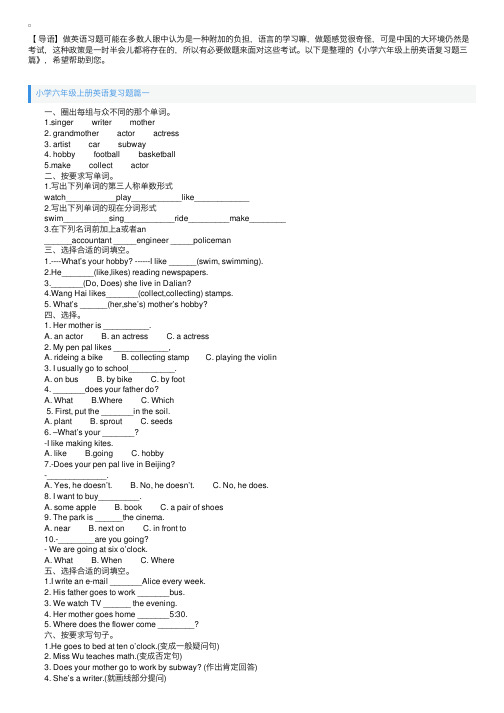
【导语】做英语习题可能在多数⼈眼中认为是⼀种附加的负担,语⾔的学习嘛,做题感觉很奇怪,可是中国的⼤环境仍然是考试,这种政策是⼀时半会⼉都将存在的,所以有必要做题来⾯对这些考试。
以下是整理的《⼩学六年级上册英语复习题三篇》,希望帮助到您。
⼩学六年级上册英语复习题篇⼀ ⼀、圈出每组与众不同的那个单词。
1.singer writer mother 2. grandmother actor actress 3. artist car subway 4. hobby football basketball 5.make collect actor ⼆、按要求写单词。
1.写出下列单词的第三⼈称单数形式 watch___________play___________like____________ 2.写出下列单词的现在分词形式 swim__________sing___________ride_________make________ 3.在下列名词前加上a或者an ______accountant _____engineer _____policeman 三、选择合适的词填空。
1.----What’s your hobby? ------I like ______(swim, swimming). 2.He_______(like,likes) reading newspapers. 3._______(Do, Does) she live in Dalian? 4.Wang Hai likes_______(collect,collecting) stamps. 5. What’s ______(her,she’s) mother’s hobby? 四、选择。
1. Her mother is __________.A. an actorB. an actressC. a actress 2. My pen pal likes ____________,A. rideing a bikeB. collecting stampC. playing the violin 3. I usually go to school__________.A. on busB. by bikeC. by foot 4. _______does your father do?A. WhatB.WhereC. Which 5. First, put the _______in the soil.A. plantB. sproutC. seeds 6. –What’s your _______? -I like making kites.A. likeB.goingC. hobby 7.-Does your pen pal live in Beijing? -_____________.A. Yes, he doesn’t.B. No, he doesn’t.C. No, he does. 8. I want to buy_________.A. some appleB. bookC. a pair of shoes 9. The park is ______the cinema.A. nearB. next onC. in front to 10.-________are you going? - We are going at six o’clock.A. WhatB. WhenC. Where 五、选择合适的词填空。
人教版六年级英语上册全册重点句型复习
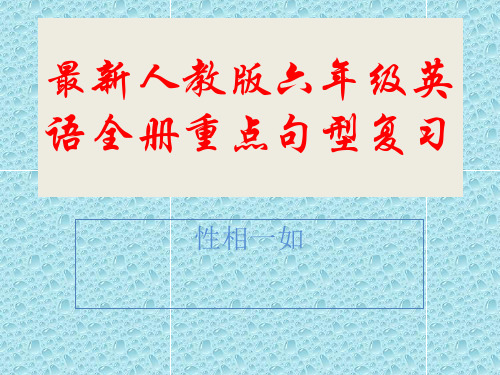
性相一如
1、Where Is the hospital? It’s in front of the cinema.
问路句型
Where is +地点? It’s +表示位置的短语。
2、How can we get there? Turn left at the bookstore.
• Hobbies, are, what, your(?) • What are your hobbies? • Like,she,dancing,does(?) • Does she like dancing? • Live, I, in, Changsha(.) • I live in Changsha. • I,like, reading, stories,also(.) • I also like reading stories.
2、以不发音的字母e结尾,去e加ing • 如make---making,write---writing • 末尾只有一个辅音字母的重读闭音节,双写末
尾辅音字母,再加ing,如stop—stopping, begin--beginning
Does he live in Sydney? No,he doesn’t.
做什么的?
Where does he work? He works at sea .
询问他人的工作地点 Where does +主语(第三人称单数)+work? He/She works +表示地点的介词短语 询问他人上班方式句型及答语 How does +主语(第三人称单数 )+go to work? He/She goes to work +出行方式(by bike , on foot , by bus …)
六年级英语上册期末复习资料(人教版六年级上英语全册期末复习提纲)

am 只跟I放在一起be动词 is 主语是单数时用are 主语是复数时用Unit 1 询问一些地点在哪;怎样到达一些地点1.询问地点在哪:Where is the 地点Where is the cinema? 电影院在哪?回答: near(附近)next to(旁边)It’s behind(后面) the 地点in front of(前面)It’s near the zoo. 它在动物园附近。
2. 询问怎样到达一个地点:How can I get to the 地点How can I get there/ here ?How can I get to the cinema? 我怎样到达电影院?回答:turn leftturn right at the 地点 go straightTurn right at the zoo. 动物园右转。
Turn left at the zoo, and then go straight, the cinema is on your left.动物园左转然后直走,电影院在你的左边。
或:You can Take the No.57 bus. 你可以乘坐57路公交车。
人 can take the No.数字 busUnit2 到达一些地点的交通方式doesHow do you go to school? 你怎么去学校?回答:人 go(goes) to school by 交通工具I go to school on foot. She goes to school by bus.2.人 must 动词原形人必须……People on bikes must wear one. 骑自行车的人必须戴一个。
I must pay attention to the traffic lights. 我必须注意交通信号灯。
Unit3 人打算做事1.人 be going to do(动词原形) 人打算(或将要)去做事She is going to see a film. 她打算去看电影。
(完整word版)PEP人教版六年级英语上册各单元复习要点
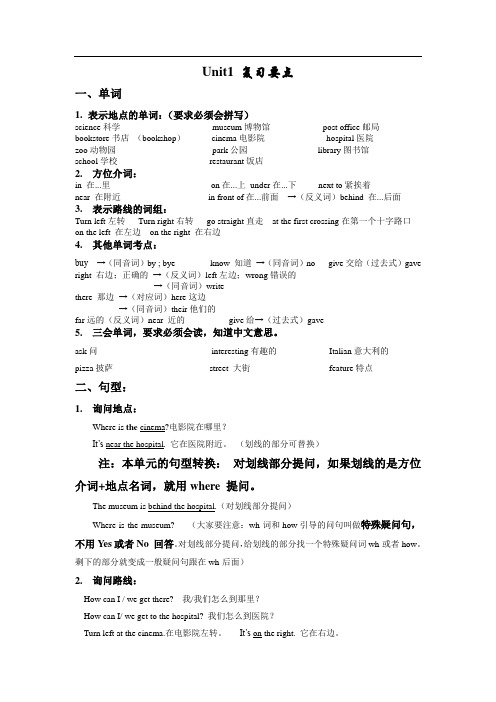
Unit1 复习要点一、单词1.表示地点的单词:(要求必须会拼写)science科学museum博物馆post office邮局bookstore书店(bookshop)cinema电影院hospital医院zoo动物园park公园library图书馆school学校restaurant饭店2.方位介词:in 在...里on在...上under在...下next to紧挨着near 在附近in front of在...前面→(反义词)behind 在...后面3.表示路线的词组:Turn left左转Turn right右转go straight直走at the first crossing在第一个十字路口on the left 在左边on the right 在右边4.其他单词考点:buy →(同音词)by ; bye know 知道→(同音词)no give交给(过去式)gave right 右边;正确的→(反义词)left左边;wrong错误的→(同音词)writethere 那边→(对应词)here这边→(同音词)their他们的far远的(反义词)near 近的give给→(过去式)gave5.三会单词,要求必须会读,知道中文意思。
ask问interesting有趣的Italian意大利的pizza披萨street 大街feature特点二、句型:1.询问地点:Where is the cinema?电影院在哪里?It’s near the hospital. 它在医院附近。
(划线的部分可替换)注:本单元的句型转换:对划线部分提问,如果划线的是方位介词+地点名词,就用where 提问。
The museum is behind the hospital.(对划线部分提问)Where is the museum? (大家要注意:wh-词和how引导的问句叫做特殊疑问句,不用Yes或者No 回答。
六年级英语上册复习知识

六年级英语上册复习知识(一)(一)一般现在时1、概念:表示经常性或习惯性发生的动作。
2、标志词:often,usually,sometimes, alaways, every day等3、主语是第三人称单数he, she, it 时,谓语动词要加s或es,其他人称动词要用原形。
4、主语是第三人称单数时,动词变化规则:A、一般情况,在动词后面直接加s,如:walk-walks.B、以sh, ch, o结尾的,在动词后面加es,如:wash-washes,watch-watches, go--goesC、以辅音加y结尾,将y改为i,再加es,如:study-studies.(二)现在进行时:1、概念:表示正在发生的事情或动作。
2、标志词:now, look, listen , it’s……3、结构:b e(am, is , are)+动词ing4、动词加的规则如下:A、一般情况下,在动词后面直接加ing,如:listen-listeningB、以不发音的e结尾,去e加ing,如:take-taking (make, like, write , come)C、以重读闭音节(辅音+元音+辅音)结尾的,要双写最后一个字母再加ing,如put-putting, (get, sit, stop , run, swim, set)但:see-seeing, eat –eating.(三)一般将来时:1、概念:表示将要发生的事或打算,计划要做的事。
2、标志词:this weekend, next Monday, tomorrow, in seven years’ time3、结构:be(am, is , are) going to +动词原形或者 Will+动词原形如:I am going to take a trip next week.4、否定句:be+not going to +动词原形或者 Will+not(等于won’t)+动词原形(四)一般过去时:1、概念:表示在过去的时间里所发生的事或动作。
六年级上册英语复习资料
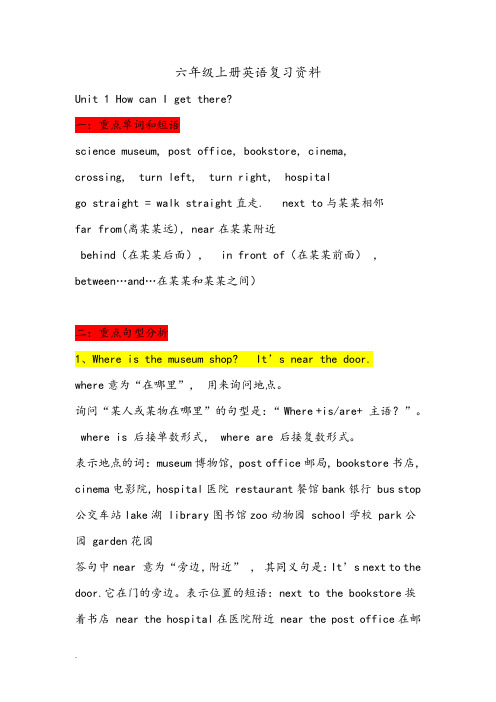
六年级上册英语复习资料Unit 1 How can I get there?一:重点单词和短语science museum, post office, bookstore, cinema,crossing, turn left, turn right, hospitalgo straight = walk straight直走. next to与某某相邻far from(离某某远), near在某某附近behind(在某某后面), in front of(在某某前面),between…and…在某某和某某之间)二:重点句型分析1、Where is the museum shop? It’s near the door.where意为“在哪里”,用来询问地点。
询问“某人或某物在哪里”的句型是:“ Where +is/are+ 主语?”。
where is 后接单数形式, where are 后接复数形式。
表示地点的词:museum博物馆, post office邮局, bookstore书店, cinema电影院, hospital医院 restaurant餐馆bank银行 bus stop 公交车站lake湖 library图书馆zoo动物园 school学校 park公园 garden花园答句中near 意为“旁边,附近” ,其同义句是:It’s next to the door.它在门的旁边。
表示位置的短语:next to the bookstore挨着书店 near the hospital在医院附近 near the post office在邮局附近over there 在那边on Dongfang Street在东方大街上 in front of the school在学校前面2、How can we get there? Turn right at the hospital考查How引导的特殊疑问句,用于提问方式、方法。
六年级英语上册知识点复习汇总
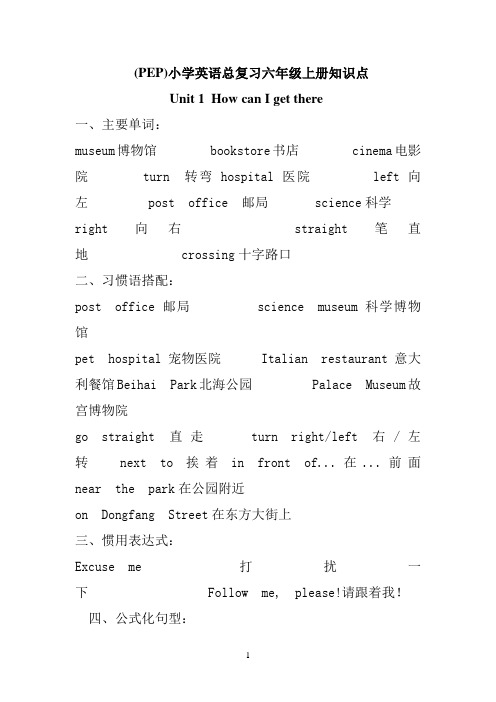
(PEP)小学英语总复习六年级上册知识点Unit 1 How can I get there一、主要单词:museum博物馆bookstore书店cinema电影院turn 转弯hospital医院left向左post office 邮局science科学right向右straight笔直地crossing十字路口二、习惯语搭配:post office邮局science museum科学博物馆pet hospital宠物医院Italian restaurant意大利餐馆Beihai Park北海公园 Palace Museum故宫博物院go straight直走turn right/left右/左转next to挨着in front of...在...前面near the park在公园附近on Dongfang Street在东方大街上三、惯用表达式:Excuse me 打扰一下Follow me, please!请跟着我!四、公式化句型:1、问路的句型及其答语:问句:Where is the + 地点······在哪儿答语:It's + 表示地点的词语(next to the bookstore,near the hospital/post office, over there,on Dongfang Street, infront of the school... )2、询问怎么到某地的句型及其答语:问句:How can +主语+ get (to)+地点·····怎么到·····同义句型:Can you tell me the way to +地点Where is + 地点Which is the way to +地点五、例句:Where is the cinema, please 请问电影院在哪里It's next to the hospital.它与医院相邻。
六年级英语上册复习教案

六年级英语上册复习教案一、教学目标1. 知识与技能:通过复习,使学生巩固和掌握本册书中的重点单词、词组、句型和语法知识。
2. 过程与方法:采用多种教学活动,激发学生的学习兴趣,提高他们的听说读写能力。
3. 情感态度与价值观:培养学生的团队协作精神,让他们在复习过程中感受到学习英语的乐趣。
二、教学内容1. 单词复习:根据单元顺序,复习本册书中的重点单词。
2. 词组复习:复习本册书中的重要词组。
3. 句型复习:复习本册书中的关键句型。
4. 语法复习:复习本册书中的主要语法点。
三、教学重点与难点1. 重点:复习本册书中的重点单词、词组、句型和语法知识。
2. 难点:针对不同学生的学习情况,重点辅导那些较难掌握的知识点。
四、教学方法1. 采用任务型教学法,让学生在完成具体任务的过程中复习所学知识。
2. 运用游戏教学法,激发学生的学习兴趣,提高他们的参与度。
3. 采用分组合作学习,培养学生的团队协作精神。
五、教学步骤1. 热身活动:通过播放英语歌曲,让学生活跃气氛,进入学习状态。
2. 单词复习:采用闪卡、接龙等游戏方式,让学生复习重点单词。
3. 词组复习:运用情景剧、小组讨论等形式,让学生复习重要词组。
4. 句型复习:通过角色扮演、口语交流等环节,让学生复习关键句型。
5. 语法复习:运用例句解析、练习题等形式,让学生复习主要语法点。
6. 总结与反馈:对学生的复习情况进行总结,针对存在的问题进行讲解和辅导。
7. 作业布置:布置适量作业,让学生巩固所学知识。
8. 课后反思:对本节课的复习效果进行反思,为下一节课的教学做好准备。
六、教学评价1. 学生自评:让学生在学习过程中对自己的学习情况进行评价,以提高他们的自我认知能力。
2. 同伴评价:让学生互相评价,取长补短,共同进步。
3. 教师评价:根据学生的课堂表现、作业完成情况和测试成绩,对学生的学习情况进行全面评价。
七、教学资源1. 教材:六年级英语上册教材。
2. 课件:制作与教学内容相关的课件,辅助课堂教学。
PEP六年级上册英语总复习资料
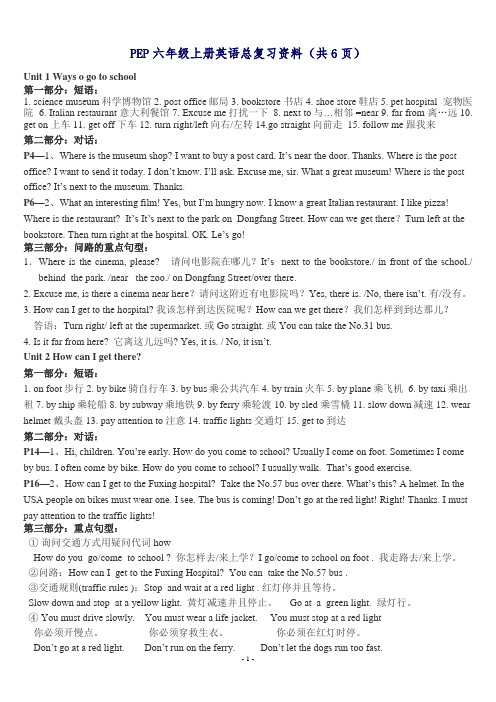
PEP六年级上册英语总复习资料(共6页)Unit 1 Ways o go to school第一部分:短语:1. science museum科学博物馆2. post office邮局 3. bookstore 书店4. shoe store鞋店5. pet hospital 宠物医院 6. Italian restaurant 意大利餐馆 7. Excuse me打扰一下 8. next to与...相邻 =near 9. far from 离 (10)get on 上车11. get off 下车12. turn right/left向右/左转14.go straight向前走 15. follow me 跟我来第二部分:对话:P4—1、Where is the museum shop? I want to buy a post card. It‟s near the door. Thanks. Where is the post office? I want to send it today. I don‟t know. I‟ll ask. Excuse me, sir. What a great museum! Where is the post office? It‟s next to the museum. Thanks.P6—2、Wh at an interesting film! Yes, but I‟m hungry now. I know a great Italian restaurant. I like pizza! Where is the restaurant? It‟s It‟s next to the park on Dongfang Street. How can we get there?Turn left at the bookstore. Then turn right at the hospital. OK. Le‟s go!第三部分:问路的重点句型:1.Where is the cinema, please? 请问电影院在哪儿?It‟s next to the bookstore./ in front of the school./ behind the park. /near the zoo./ on Dongfang Street/over there.2. Excuse me, is there a cinema near here?请问这附近有电影院吗?Yes, there is. /No, there isn‟t.有/没有。
人教版小学六年级英语上册知识点总结和复习要点
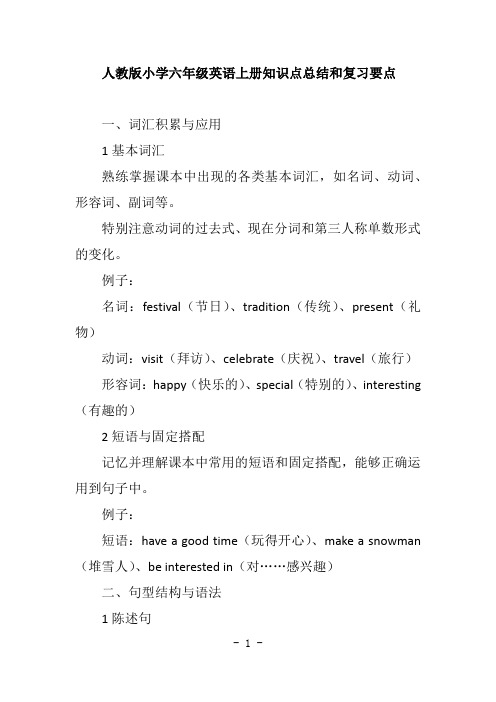
人教版小学六年级英语上册知识点总结和复习要点一、词汇积累与应用1基本词汇熟练掌握课本中出现的各类基本词汇,如名词、动词、形容词、副词等。
特别注意动词的过去式、现在分词和第三人称单数形式的变化。
例子:名词:festival(节日)、tradition(传统)、present(礼物)动词:visit(拜访)、celebrate(庆祝)、travel(旅行)形容词:happy(快乐的)、special(特别的)、interesting (有趣的)2短语与固定搭配记忆并理解课本中常用的短语和固定搭配,能够正确运用到句子中。
例子:短语:have a good time(玩得开心)、make a snowman (堆雪人)、be interested in(对……感兴趣)二、句型结构与语法1陈述句复习并巩固陈述句的基本结构,能够正确构建和表达完整的句子。
例子:陈述句:I like playing football in the afternoon.(我喜欢下午踢足球。
)2疑问句学习和掌握特殊疑问句、一般疑问句及其回答方式,能够准确理解并回答问题。
例子:特殊疑问句:What do you usually do on your birthday?(你生日通常做什么?)回答:I usually have a birthday party with my friends.(我通常和朋友们一起举办生日派对。
)3祈使句巩固祈使句的基本用法,能够正确使用祈使句表达请求、命令或建议。
例子:祈使句:Please don’t forget to bring your homework tomorrow.(请别忘了明天带作业来。
)4时态复习并巩固一般现在时、一般过去时、一般将来时和现在进行时等时态的基本用法和形式。
例子:一般现在时:She often reads books after dinner.(她晚饭后经常看书。
)一般过去时:We went to the zoo last weekend and saw many animals.(我们上周末去了动物园,看到了很多动物。
- 1、下载文档前请自行甄别文档内容的完整性,平台不提供额外的编辑、内容补充、找答案等附加服务。
- 2、"仅部分预览"的文档,不可在线预览部分如存在完整性等问题,可反馈申请退款(可完整预览的文档不适用该条件!)。
- 3、如文档侵犯您的权益,请联系客服反馈,我们会尽快为您处理(人工客服工作时间:9:00-18:30)。
六年级上册Unit 1play the violin 拉小提琴do eye exercises 做眼保健操play sports 参加体育活动learn English 学英语have a rest 休息一下take out the book 取出书本Unit 2take a walk 散步play ping-pong 打乒乓球play tennis 打网球go boating 划船go skating 滑冰go shopping 购物Unit 3pick flowers 摘花cut down trees 砍树make the air dirty污染空气waste water 浪费水drive a car 开车Unit 4go on a picnic 去野餐take out of 取出put into 放入get to the park 到达公园meet at the gate 在大门口会合Unit 6watch a show 看表演look after Grandma照顾奶奶do housework 做家务see a friend 看望朋友have a match 举行一场比赛go away 离开Unit 7play beach volleyball打沙滩排球visit the museum 参观博物馆buy some gifts 买一些礼物eat sea food 吃海鲜make a cake 做蛋糕Unit 8tell a joke 讲笑话act a play 演话剧play the guitar 弹吉他win a gift 赢得礼物六年级上册知识要点重点句型(会听,写,认):Unit 1(日常活动、时间安排)1. Can I go out to play?我能出去玩吗?----I’m afraid you can’t. 恐怕你不能。
----Of course, you can.当然能。
2. It’s time to play the violin.该是拉小提琴的时候了3. -Sorry.对不起。
----It doesn’t matter.没关系/不要紧。
4. What are you doing?你在做什么?----I’m having a rest.我正在休息。
5. ----What’s the time?什么时间了?----It’s half past seven.是7点半。
★half past +数字,表示“……点半”6. You have no time to have breakfast.你没有时间吃早餐。
★have no time to do(动词原形) sth.(某事) 没有时间做某事7. Li Shan always gets up at half past six.李珊总是在六点半起床。
Unit 2 (饮食与健康)1. You look healthy.你看起来很健康。
2. Do you often eat fruits and vegetables.? 你经常吃水果和蔬菜吗?Yes, I do / No, I don’t3.----How often do you drink milk?你多久喝一次牛奶?----Every day.每天。
★how often的意思是“多久一次”,表示频率,用来提问在某一特定的时间进行某个动作的次数,答语通常是always,usually,often,oncea day, twice a week,once a month4. ----How often does Li Shan go skating? 李珊多久一次去滑冰?----She goes skating twice a week.她去滑冰每周两次。
1. Li Shan is a healthy girl.李珊是一个健康的女孩。
Unit 3(保护环境)1. I have to clean my bike我不得不清理我的自行车2.Why not go in your dad’s car? 为什么不坐你爸爸的小汽车呢?3. Because today is World Car Free Day.因为今天是世界无车日。
4. It’s time to do something for our earth.是为我们的地球做一些事情的时候了。
5.I think I should go to work on foot today. 我认为我今天应该走路去上班。
2. We all live on the earth. 我们都住在地球上。
3. We have only one earth.我们只有一个地球。
4. We waste too much water.我们浪费了太多的水。
★too much后面跟不可数名词5. We cut down too many trees. 我们砍了太多的树。
too many后面跟可数名词复数6. A:What s houldn’t we do? 我们不应该做什么?B:We shouldn’t drive the car today.今天我们不应该开车。
7. A:What should we do? 我们应该做什么?B:We should care for the earth.我们应该关爱地球。
★should(应该), may(也许,可以), can(能), must(一定)都是情态动词,它们的否定形式是在后面加not。
不管肯定还是否定,它后面跟的动词都用原形。
Unit 4(户外活动)1.What’s the matter?= What’s wrong? 怎么了?发生了什么事?2. What’s up? 什么事?3. Are you free next Saturday? 下周六你有空吗?Yes. What’s up?有,什么事?4. Let’s go on a picnic at the foot of the mountains 让我们去山脚下野餐吧。
5. What shall we take?我们将要带什么?We shall take food anddrinks.我们将带食物和饮料。
6. When shall we meet?8:00 or 8:30? 我们将在什么时候见面?八点还是八点半?7. Shall we meet at the gate of the park?我们将在大门口会合好吗?8. The children would like to go on a picnic at the foot of themountains孩子们想去山脚下野餐。
9. Shall we take a photo near the river? 我们将在河流附近拍照好吗?Unit 5 (衣物今昔对比)1.What a heavy rain!多么大的雨啊!What a fine day! 多么好的一天啊!What a hard-working boy! 多么勤劳的一个男孩子呀!What a good girl !多么好的一个女孩呀!★What引导的感叹句,结构:What+a/an+名词(前面可放修饰词)+主+谓!2.----Where is my raincoat?我的雨衣在哪里?----It was here just now它刚才还在这里3. ----Where are my rain boots? 我的雨靴在哪里?----Last night, they were under your bed.昨天晚上它们在你的床底下4. ----Where is my bike?我的自行车在哪里?----It was in front of the house yesterday. 昨天它在房子的前面。
5.----Was there a library?那里以前有个图书馆吗?----Yes, there was.是的,以前有。
No, there was n’t. /不,以前没有。
6.----Were there any trees? 那里以前有一些树吗?----Yes, there were/ 是的,以前有No, there weren’t。
/不,以前没有。
7.----What do you wear on a rainy day? 下雨天你穿什么?----I wear a raincoat on a rainy day. 我在下雨天穿雨衣。
Unit 6(周末活动、娱乐活动)1.----What did you do last weekend?上周末你做了什么?----I did some housework. 我做了一些家务。
2. What did your parents do?你的父母做了什么?They were busy.他们很忙3. What did your mother do?你的妈妈做了什么?She was in the hospital.她在医院里面。
4. I’m sorry to hear that.听到这个我很遗憾。
It doesn’t matter.没关系。
5.What show did you watch? 你看了什么节目?6. What happened to her? 她发生了什么事?When she was 8 years old , her mother was ill in bed.在她8岁的时候,她的妈妈卧病在床。
2. Did she go to school? 她去上学了吗?Yes, she did/ No, shedidn’tUnit 7. (假期活动)1.Did you go out to play last weekend?上周末你出去玩了吗?Yes, I did /是的,我去了No, I didn’t / 不,我没有去2. What did you do at home?在家你做了什么?I learned to cook and made a big cake.我学了做饭并且做了一个大蛋糕。
3. Where did you go last weekend?上周末你去了哪里?I flew to Hainan with my family.我和我的家人飞往了海南。
4. Last summer holiday, Su Nan went to Beijing with his parents.去年暑假,苏楠和他的父母去了北京。
5. Who did you go with?你和谁一起去的?I went with my friends 。
我和我的朋友一起去的Unit 8 (节日活动)1.----What do you think of our party?你认为我们的聚会怎么样?----It was great.太棒了!2. ----What do you think of Liu Zhaoyang’s joke?你认为刘朝阳的笑话怎么样----It was funny 太搞笑了。
